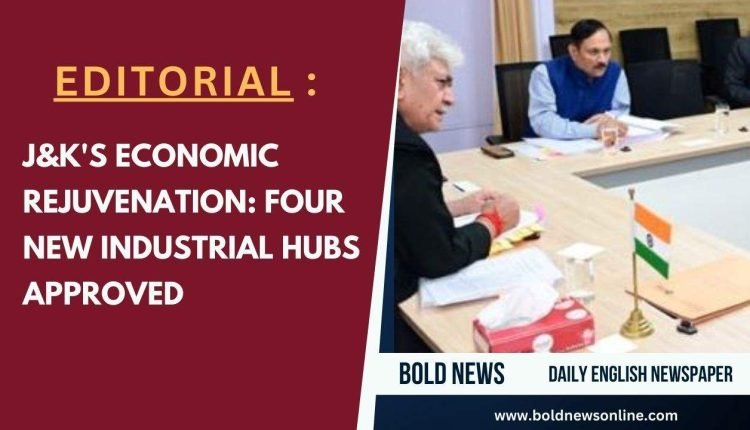Industrial estates stand as pivotal engines for robust economic growth, orchestrating a myriad of roles in reshaping regional economies. Functioning as epicenters of industrial development, these estates play a crucial part in addressing unemployment concerns by creating diverse employment opportunities for both skilled and unskilled labour. Their establishment not only triggers infrastructure development but also catalyzes the creation of resilient transportation networks and reliable energy sources that reverberate across the broader region. Beyond their foundational impact, industrial estates emerge as catalysts for economic diversification, hosting a diverse array of industries that collectively fortify the economic fabric, mitigating reliance on a singular sector. The collaborative proximity of businesses within these estates fosters supply chain integration, resulting in streamlined processes and heightened efficiency in the production and distribution of goods and services. Moreover, their strategic significance extends to attracting foreign direct investment, injecting additional capital, cutting-edge technology, and invaluable expertise into the local economic landscape. The revenue generated from these bustling economic activities not only fuels public services but also underpins infrastructure projects and social welfare programs, thereby contributing holistically to the overall development of the region. In parallel, industrial estates provide a nurturing environment for entrepreneurship and the flourishing of small and medium-sized enterprises, propelling innovation and fostering a heightened sense of competitiveness. As strategic linchpins, the positioning and management of industrial estates emerge as critical factors in optimizing their positive impact on the economic landscape, ultimately advancing the cause of regional development.
In a significant and forward-thinking initiative aimed at rejuvenating the economic landscape of Jammu and Kashmir, the Administrative Council (AC) has recently granted approval for the establishment of four new industrial estates. Under the insightful leadership of Lieutenant Governor Manoj Sinha, this strategic move seeks to redefine the economic trajectory of the Union Territory, promising increased employment opportunities and heightened prospects for investment. It is crucial to understand the decision made by the AC in the historical and socioeconomic context of Jammu and Kashmir. This region has experienced protracted fighting, which has had a significant impact on its stability and economic progress. The recent endorsement of industrial estates aligns with the overarching vision of transforming Jammu and Kashmir into a self-reliant and economically vibrant entity. The strategic selection of locations for these industrial estates is a crucial endeavour, intending to stimulate balanced development across the Union Territory. Budhi Kathua, Medicity Jammu, Chandgam, and Lelhar Pulwama represent diverse geographical regions, strategically positioned to address the distinctive economic needs of their respective areas. This spatial distribution ensures not only equitable development but also promotes regional economic specialization. The injection of Rs 136.65 Crores into the establishment of these industrial estates signifies a substantial investment in the economic future of Jammu and Kashmir. Beyond the financial aspect, the projects are poised to become crucial catalysts for job creation. Approximately 11,497 jobs are anticipated to be generated in the private sector, aligning with the overarching goal of fostering economic prosperity and inclusivity. The comprehensive development plan for these industrial estates underscores a commitment to robust infrastructure. Elements such as internal road networks, reliable electricity supply, centralized water distribution systems, rainwater harvesting, and greenery initiatives are integral components of the proposed infrastructure. This emphasis on modern amenities and sustainable practices reflects a forward-thinking approach, aligning with global standards of industrial development. In tandem with the commitment to sustainable practices, the establishment of Centralized Effluent Treatment plants adhering to National Green Tribunal norms demonstrates a proactive stance towards environmental conservation. These initiatives signal a departure from traditional industrial practices, prioritizing eco-friendly measures to mitigate environmental impact and ensure the long-term sustainability of the industrial estates.
The decision by the Administrative Council (AC) ushers in a new era for Jammu and Kashmir, although it’s crucial to recognize potential challenges during implementation. Land acquisition, community engagement, and administrative coordination pose significant hurdles, yet proactive measures, transparent communication, and community involvement can effectively address these challenges. The establishment of new industrial estates transcends mere economic growth; it holds the potential for holistic regional development. This initiative could initiate a positive ripple effect, enhancing educational and healthcare facilities, improving connectivity, and fostering a conducive ecosystem for comprehensive progress. Economic diversification through industrial growth offers a pathway to reduce dependency on traditional sectors, paving the way for a more resilient and dynamic economic structure. The approval of four industrial estates by the Administrative Council marked a pivotal moment in the history of Jammu and Kashmir. This decision holds substantial implications for infrastructure development, job creation, and economic growth. It is essential to evaluate the broader socioeconomic effects of the region’s economic recovery, gauging success in terms of benefits to the people of Jammu and Kashmir that go beyond financial gains. This initiates a fresh phase of progress and financial well-being for the whole area. As such, the government of Jammu and Kashmir deserves praise for its initiative to create four new industrial estates, which highlights its unwavering commitment to job creation and regional economic development.
The visionary leadership of Lieutenant Governor Manoj Sinha has been instrumental in steering the Union Territory toward a new era of prosperity. To ensure the sustained success of these initiatives, it is imperative for the government to prioritize transparency, engage with the community, and implement sustainable practices. Additionally, establishing a robust monitoring and evaluation mechanism is crucial to track the socio-economic impact of these industrial estates, ensuring equitable distribution of benefits across diverse communities. Through promoting collaboration and inclusivity, the Jammu and Kashmir government has the potential to catalyze a lasting economic renaissance, positively transforming the lives of its residents and setting a commendable example for future development endeavours.




